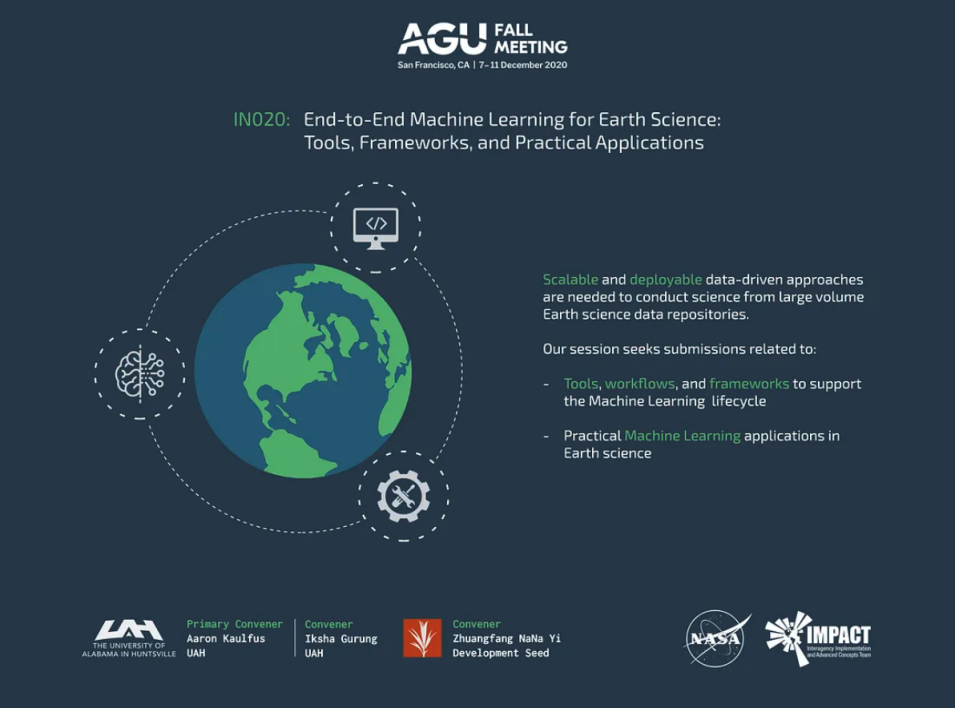IN013 — Commercial SmallSat Data: Research and Applications in Earth Science
This session invites papers on science research and applications that have used the data from commercial vendors. Additionally, the session is intended for understanding the challenges associated with the usage of commercial data.
IN037 — Scalable Cloud Optimized Spatiotemporal Data Platform (SDP) for Data Driven Analytics
This session explores the critical components of SDPs including spatiotemporal data ingest, archive, storage, computing (including machine/deep learning), visualization, distribution, modeling, analysis ready data and GIS.
IN039 — Solving Training Data Bottleneck for Artificial Intelligence/Machine Learning in Earth Science
This session seeks submissions from AI/ML practitioners and data curators using different approaches or existing products to create new datasets. This session will enable the practitioners to share successful approaches to scale the process of generating labeled datasets. We also seek submissions focusing on best practices for labeling and structuring data including catalog and standardization to benchmark and share training data.
SY012 — Data for All: Open Data Sharing to Empower Science
This session seeks to explore the numerous activities taking place across the sciences to support open data. Presentations are especially welcome that describe the development of open data policies, lessons learned from the implementation of open data policies, the economic benefits of open data, public-private partnership efforts around open data, open government initiatives, data stewardship best practices for open data, threats to open data policies and the future of open data.
IN012 — Collaborative platforms for remotely-sensed data that enable new research in the Earth Sciences
This session will cover both the scientific and technological aspects of these platforms, proving a forum for exchanging the latest results and best practices for datasets, algorithms, and processing metadata and protocols.
IN035 — Recent Advancements in Earth Science Data Discovery and Metadata Stewardship Practices
The goal of this session is to explore innovative efforts to improve Earth science data discoverability. This could include metadata stewardship tools or processes, controlled vocabularies and ontologies or collaborative/crowd-sourced metadata creation and maintenance. Stewardship and management practices that help connect users to data are welcomed. Aspects of these practices that help improve data accessibility and usability will also be explored.
IN027 — Lessons Learned on Supporting Analysis Ready Data (ARD) with Analytics Optimized Data Stores/Services (AODS) in Collaborative Analysis Platforms
This session explores recent trends and lessons learned for preparing both ARDs as well as steps that need to be taken to formally support their fast analysis in AODSes. Examples include analysis steps and procedures to decouple ARDs from AODS, socializing ARDs to scientists and algorithm developers, challenges in enhancing existing platforms to support ARD/AODS, cost implications of various AODS approaches, cloud collocation with data lakes, interoperable and standards-based approaches to AODS, subsetting, and its collaborative use.
IN028 — Linking knowledge in the Earth and Space Sciences: Pioneers of a new paradigm
The challenges confronting the Earth and Space Sciences (ESS) are increasingly complex, avoiding categorization or solution within neatly defined disciplinary boxes. We welcome contributions that illustrate better structuring knowledge across projects. We will feature pioneering progress on three broad topics: 1) the use of data science as a common language between disciplines, allowing methodology transfer to change how we work; 2) cutting-edge approaches to knowledge management through knowledge graphs/networks; and 3) pioneering advances in project integration.
